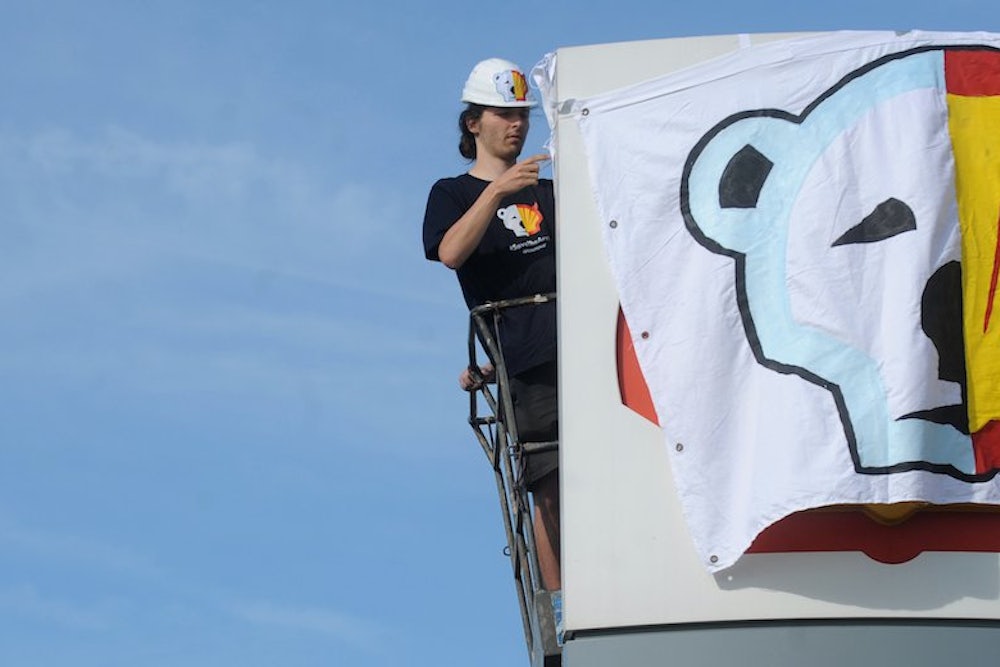The CEO of Royal Dutch Shell wants the oil industry to take a bigger role in the fight against climate change. On Thursday night, Ben van Beurden urged a room full of oil executives to “be less aloof, more assertive,” ahead of international climate talks in Paris. “The world will benefit,” he said, according to advanced excerpts of van Beurden's speech. "You cannot talk credibly about lowering emissions globally if, for example, you are slow to acknowledge climate change; if you undermine calls for an effective carbon price; and if you always descend into the 'jobs versus environment' argument in the public debate.”
He makes one good point: The climate change debate has evolved, as more and more research points to its economic costs, impact on public health, and threat to national security. There's growing support for action, and oil companies have felt that pressure. Earlier this month, BP and Shell bowed to shareholder pressure for more transparency about the companies' polluting activities.
But Shell's strategy to take on a more robust role is far more dangerous to environmental progress than ignoring the issue.
Activists have made limited gains on climate policies in the last few years. Governments around the world, including the U.S., China, and in Europe, are already moving ahead with variations of a carbon tax, cap-and-trade, and direct greenhouse gas regulations. By the end of the year, countries could sign on to a new global deal aimed at curbing carbon pollution.
Shell wants to see Big Oil move into an offensive position on climate change. Oil companies, led by ExxonMobil, did the same thing in 2009. The industry seemingly embraced cap-and-trade legislation in Congress only to help weaken and then defeat the Waxman-Markey bill in the Senate. In Private Empire: ExxonMobil and American Power, author Steve Coll explained how Exxon embraced a carbon tax early, but later lobbied against climate legislation. “By moving early, the corporation could seek to prove, by accepting cap and trade or a carbon price at least in principle, that its new leadership recognized the seriousness of the risks of climate change,” Coll wrote. “ExxonMobil had changed its public posture by endorsing a carbon tax, but it didn’t want cap and trade to succeed.” And as cap-and-trade made its way through the House and Senate, Exxon’s lobbyists targeted the swing votes, arguing a cap-and-trade law would destroy and hurt lawmakers politically.
Shell is simply reusing Exxon's old tactics. The oil industry has no intention to abandon its economic interests, but senses that climate action is inevitable. By not shying away from the issue, Shell means to delay and weaken policies that curtail fossil fuel development.
One sign of the CEO's insincerity is his straw man argument that it's impossible to end our reliance on fossil fuels abruptly. "The issue is how to balance one moral obligation, energy access for all, against the other: fighting climate change," he said. "We still need fossil fuels for a lower carbon, higher energy future." No one is trying to halt oil production tomorrow; rather, the hope is for rich countries to phase out greenhouse gasses faster than poor ones. But the subtext of van Beurden's speech is clear: He thinks it is necessary for the world to burn through its oil reserves for years to come. That's impossible if world leaders want to also keep global warming's harm to a moderate level: In order to stay under 2 degrees Celsius of warming, 33 percent of world reserves of oil and 49 percent of its gas reserves would have to stay in the ground, according to a study published in Nature.
The study also found that oil in the Arctic can't be burned. Shell plans to drill there next.
